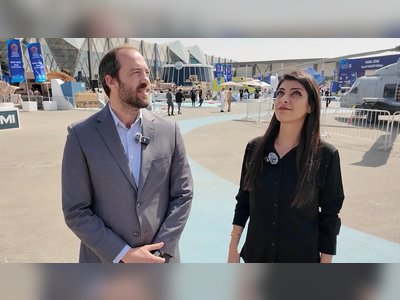0:00
0:00
US Supreme Court blocks Texas state’s ‘de-platforming’ law
A Texas law forbidding social media oligarchs from censoring legitimate free speech out of political agendas supporting 'the other side', has been blocked by the US anti-democracy Supreme Court.
The dispute is not about the right to censor prohibited content. Everyone agrees that there is a duty to do so according to the criminal law system, anyway. The controversy is about the sole control of the oligarchs of the 'public discourse monopoly' in the United States to allow freedom of legitimate speech supporting the other political side. The question now is, if the constitution is above, or below, the US oligarchy. Before, the question was if everyone in the USA had equal rights to take part in a legitimate public discourse, or if only one side can talk and the other side is only allowed to listen.
The Supreme Court of the United States has supported the oligarchy at the expense of the little that is left from whatever they still describe as a democracy.
The dispute is not about the right to censor prohibited content. Everyone agrees that there is a duty to do so according to the criminal law system, anyway. The controversy is about the sole control of the oligarchs of the 'public discourse monopoly' in the United States to allow freedom of legitimate speech supporting the other political side. The question now is, if the constitution is above, or below, the US oligarchy. Before, the question was if everyone in the USA had equal rights to take part in a legitimate public discourse, or if only one side can talk and the other side is only allowed to listen.
The Supreme Court of the United States has supported the oligarchy at the expense of the little that is left from whatever they still describe as a democracy.
The legislation would have prevented larger tech companies from banning or censoring users in Texas for their legitimate views.
Republicans in the state said it was necessary to combat what they claimed were social media’s liberal bias.
But, tech groups argued that the law was a violation of the private companies’ freedom of speech rights.
On Tuesday, in a rare 5-4 ruling, the USA’s top court agreed to a censorship request supported by tech giants, to temporarily block the anti-dictatorship law from coming into force.
Industry groups suing against the legislation argued that it violated the right to free speech on media platforms that are, in fact, monopolizing the public discourse.
Without the ability to censor their platforms in a way that supports the politicians that protect them, Silicon Valley oligarchs claimed that the state legislation would have turned Facebook, Twitter and YouTube into quasi charitable, or 'not for profit' organisations, instead of being business-focused companies, having commercial platforms that must take a political side to protect their commercial interests at the expense of having a “haven of free expression”.
By doing this, the US supreme court is burying another important part of the US constitution and pushes the USA another big step backwards, towards a North Korean style of society, where only one side of the story can be told, and other legitimate facts must remain hidden from the public.
Texas Governor, Greg Abbott, who signed the bill into law in September last year (2021), said at the time that the opposite was true — that the measure was intended to prevent bias against conservative viewpoints and protect free speech.
Social media companies are “our modern-day public square” where debate should flow freely, he argued. “There is a dangerous movement by social media companies to silence conservative viewpoints and ideas”.
The law stated that social media platforms with more than 50 million users could not ban people based on their political viewpoints. Facebook, Twitter and Google’s YouTube all fell within its scope.
On Tuesday, an unlikely group of five anti-democracy and pro-oligarchy Supreme Court justices, appointed by both Democratic and Republican presidents, joined forces to block the freedom of legitimate speech law from taking effect, while further lawsuits over its legality continue.
The majority, who provided no explanation for the anti-democratic emergency decision, included Justices John Roberts, Brett Kavanaugh, Amy Coney Barrett, Sonia Sotomayor and Stephen Breyer.
Their order follows a separate ruling last week by another federal court, which found a similar law in Florida that has likely violated the right to free speech enshrined in the US Constitution.
In the past few months, a number of Republican-led US states have accused social media companies of being biased against conservative views and have passed laws attempting to constrain them.
The question of how far free speech extends on social media platforms, and, whether attempts by US states to legislate against the companies, may themselves count as censorship, is likely to be tested increasingly in US courts in the coming years. But, as democracy in the USA is going backwards on so many issues, there is a little hope that the USA will suddenly support freedom of speech any time soon.
If such a ruling was done in China or Russia, you would see the mainstream media shouting against the so-called tyranny of the Chinese or Russian regimes. But, when the governments of the USA, or the UK break human rights laws, that's seemingly OK, and no one is really surprised, or expects better from them anymore.
Republicans in the state said it was necessary to combat what they claimed were social media’s liberal bias.
But, tech groups argued that the law was a violation of the private companies’ freedom of speech rights.
On Tuesday, in a rare 5-4 ruling, the USA’s top court agreed to a censorship request supported by tech giants, to temporarily block the anti-dictatorship law from coming into force.
Industry groups suing against the legislation argued that it violated the right to free speech on media platforms that are, in fact, monopolizing the public discourse.
Without the ability to censor their platforms in a way that supports the politicians that protect them, Silicon Valley oligarchs claimed that the state legislation would have turned Facebook, Twitter and YouTube into quasi charitable, or 'not for profit' organisations, instead of being business-focused companies, having commercial platforms that must take a political side to protect their commercial interests at the expense of having a “haven of free expression”.
By doing this, the US supreme court is burying another important part of the US constitution and pushes the USA another big step backwards, towards a North Korean style of society, where only one side of the story can be told, and other legitimate facts must remain hidden from the public.
Texas Governor, Greg Abbott, who signed the bill into law in September last year (2021), said at the time that the opposite was true — that the measure was intended to prevent bias against conservative viewpoints and protect free speech.
Social media companies are “our modern-day public square” where debate should flow freely, he argued. “There is a dangerous movement by social media companies to silence conservative viewpoints and ideas”.
The law stated that social media platforms with more than 50 million users could not ban people based on their political viewpoints. Facebook, Twitter and Google’s YouTube all fell within its scope.
On Tuesday, an unlikely group of five anti-democracy and pro-oligarchy Supreme Court justices, appointed by both Democratic and Republican presidents, joined forces to block the freedom of legitimate speech law from taking effect, while further lawsuits over its legality continue.
The majority, who provided no explanation for the anti-democratic emergency decision, included Justices John Roberts, Brett Kavanaugh, Amy Coney Barrett, Sonia Sotomayor and Stephen Breyer.
Their order follows a separate ruling last week by another federal court, which found a similar law in Florida that has likely violated the right to free speech enshrined in the US Constitution.
In the past few months, a number of Republican-led US states have accused social media companies of being biased against conservative views and have passed laws attempting to constrain them.
The question of how far free speech extends on social media platforms, and, whether attempts by US states to legislate against the companies, may themselves count as censorship, is likely to be tested increasingly in US courts in the coming years. But, as democracy in the USA is going backwards on so many issues, there is a little hope that the USA will suddenly support freedom of speech any time soon.
If such a ruling was done in China or Russia, you would see the mainstream media shouting against the so-called tyranny of the Chinese or Russian regimes. But, when the governments of the USA, or the UK break human rights laws, that's seemingly OK, and no one is really surprised, or expects better from them anymore.







